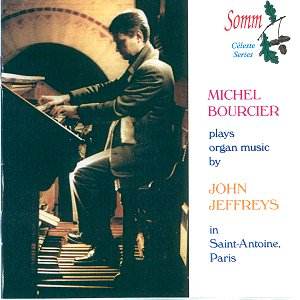A casual visit to a Suffolk church with an organist
friend whose masterly improvisation on the instrument greatly impressed
Jeffreys led to the composition of a body of music for organ - the bulk
of which, including two major compositions, is given in this recital
from the Paris church of Saint-Antoine des Quinze-Vingts.
The instrument, originally commissioned by Baron Albert
de l'Espée for his Bois de Boulogne house, was later installed
in its present church as being too powerful for its original domestic
situation. That power is certainly demonstrated here - as is the complete
contrast in the most delicate sonorities (in the rustling of Canon Howard's
little mice, one of the sketches especially written for the chamber
organ at the church at Otten, North Essex.)
Jeffreys is perhaps best known for his many songs -
settings of words from the 16th Century and from the more recent Georgians
of the 'thirties. His studies at college were counterpoint and musical
philosophy - and while a light balance is achieved in his songs with
quasi-Warlockian jollity, and light-hearted love songs, concentration
is needed here to follow the slow deliberate unfolding of his musical
thought.
The two major compositions on this disc - a complex
Fantasia written for Alfred David Williams, the friend whose
introduction to the instrument was the improvisatory spark (at 17 minutes
the most substantial piece on the disc) - and an equally substantial
Flourish, Affirmation, Meditation and Six Variations - are both
powerful, deep and imbued with a compelling spirituality.
There are a number of shorter pieces, drawn from 'Music
from Otten' and 'Duodecimedes' (twelve character pieces)
and also another larger-scale 'Christ in Majesty' of considerable
intensity whose dark-hued harmonies echo solemnly from the cold stone
- and the recital ends with an evocation of the vast loneliness of a
visit to the summit of Cader Idris, reflecting Jeffreys' Welsh origins
and in some strange way the spirituality that emanates from such a sense
of place.
Like all good things this music is to be savoured,
not rushed, and in the hands of Michel Bourcier, now Professor of Organ
at Rennes Conservatoire, it is impressively moving.
Colin Scott-Sutherland


